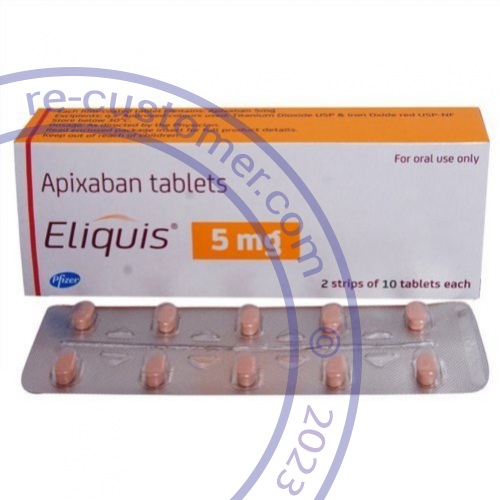 Fildena® Super Active100mg × 120 kapsułki żelowe × 1 (zl 790.76)
Fildena® Super Active100mg × 120 kapsułki żelowe × 1 (zl 790.76) Neurontin300mg × 60 tabletki × 1 (zl 263.46)
Neurontin300mg × 60 tabletki × 1 (zl 263.46) Cartia XT120mg × 90 tabletki × 1 (zl 646.31)
Cartia XT120mg × 90 tabletki × 1 (zl 646.31) Stromectol12mg × 30 tabletki × 1 (zl 508.28)
Stromectol12mg × 30 tabletki × 1 (zl 508.28) Trecator-SC250mg × 60 tabletki × 1 (zl 414.12)
Trecator-SC250mg × 60 tabletki × 1 (zl 414.12) Tobrex0.3% 5ml × 4 kroplomierze × 1 (zl 274.76)
Tobrex0.3% 5ml × 4 kroplomierze × 1 (zl 274.76) Trintellix10mg × 30 tabletki × 1 (zl 734.26)
Trintellix10mg × 30 tabletki × 1 (zl 734.26) Bystolic5mg × 120 tabletki × 1 (zl 619.20)
Bystolic5mg × 120 tabletki × 1 (zl 619.20)

Choroby Układu Krążenia, Chirurgia
Brand(s): Eliquis
Producent: Pfizer
Choroby: Blood Clots / Deep Vein Thrombosis
| Pakiet | Cena | Za tabletka | Oszczędności | Zamówienie |
|---|---|---|---|---|
| 2.5mg × 90 tabletki | zl 2033.67 | zl 22.60 | zl 677.58 | Dodaj do koszyka |
| Darmowe wysyłki pocztą lotniczą | ||||
| 2.5mg × 60 tabletki | zl 1581.70 | zl 26.36 | zl 225.80 | Dodaj do koszyka |
| Darmowe wysyłki pocztą lotniczą | ||||
| 2.5mg × 30 tabletki | zl 903.75 | zl 30.12 | Dodaj do koszyka | |
| Darmowe wysyłki pocztą lotniczą | ||||
| Pakiet | Cena | Za tabletka | Oszczędności | Zamówienie |
|---|---|---|---|---|
| 5mg × 90 tabletki | zl 2203.16 | zl 24.48 | zl 847.06 | Dodaj do koszyka |
| Darmowe wysyłki pocztą lotniczą | ||||
| 5mg × 60 tabletki | zl 1694.69 | zl 28.24 | zl 338.79 | Dodaj do koszyka |
| Darmowe wysyłki pocztą lotniczą | ||||
| 5mg × 30 tabletki | zl 1016.74 | zl 33.89 | Dodaj do koszyka | |
| Darmowe wysyłki pocztą lotniczą | ||||
Apixaban tablets
What is apixaban?
Apixaban is used to lower the risk of stroke caused by a blood clot in people with a heart rhythm disorder called atrial fibrillation.
Apixaban is also used after hip or knee replacement surgery to prevent a type of blood clot called deep vein thrombosis (DVT), which can lead to blood clots in the lungs (pulmonary embolism).
Apixaban is also used to treat DVT or pulmonary embolism (PE), and to lower your risk of having a repeat DVT or PE.
Apixaban may also be used for purposes not listed in this medication guide.
Warnings
Apixaban increases your risk of severe or fatal bleeding, especially if you take certain medicines at the same time (including some over-the-counter medicines). Tell your doctor about all medicines you have recently used.
Call your doctor at once if you have signs of bleeding such as: easy bruising, unusual bleeding, unexpected pain or swelling, feeling very weak or dizzy, bleeding gums, nosebleeds, heavy menstrual bleeding, blood in your urine or stools, coughing up blood or vomit that looks like coffee grounds, or any bleeding that will not stop.
Apixaban can cause a very serious blood clot around your spinal cord that can lead to long-term or permanent paralysis. This type of blood clot can occur during a spinal tap or spinal anesthesia (epidural), especially if you have a genetic spinal defect, if you use a spinal catheter, if you've had spinal surgery or repeated spinal taps, or if you use other drugs that can affect blood clotting.
Get emergency medical help if you have symptoms of a spinal cord blood clot such as tingling, numbness, or muscle weakness especially in your legs and feet.
Do not stop taking apixaban unless your doctor tells you to. Stopping suddenly can increase your risk of blood clot or stroke.
Before taking this medicine
You should not take apixaban if you are allergic to it, or if you have active bleeding from a surgery, injury, or other cause.
Apixaban may cause you to bleed more easily, especially if you have a bleeding disorder that is inherited or caused by disease.
Tell your doctor if you have an artificial heart valve, or if you have ever had:
- bleeding problems;
- antiphospholipid syndrome, especially if you have a triple positive antibody test; or
- liver or kidney disease.
Apixaban can cause a very serious blood clot around your spinal cord if you undergo a spinal tap or receive spinal anesthesia (epidural). This type of blood clot could cause long-term paralysis, and may be more likely to occur if:
- you have a spinal catheter in place or if a catheter has been recently removed;
- you have a history of spinal surgery or repeated spinal taps;
- you have recently had a spinal tap or epidural anesthesia;
- you take aspirin or other NSAIDs (nonsteroidal anti-inflammatory drugs)--ibuprofen (Advil, Motrin), naproxen (Aleve), diclofenac, indomethacin, meloxicam, and others; or
- you are using other medicines to treat or prevent blood clots.
Taking apixaban may increase the risk of bleeding while you are pregnant or during your delivery. Tell your doctor if you are pregnant or plan to become pregnant.
Do not breastfeed.
How should I take apixaban?
Follow all directions on your prescription label and read all medication guides or instruction sheets. Your doctor may occasionally change your dose. Use the medicine exactly as directed.
You may take apixaban with or without food.
If you cannot swallow a tablet whole, crush it and mix with water, apple juice, or applesauce. Swallow the mixture right away without chewing.
A crushed tablet mixture may also be given through a nasogastric (NG) feeding tube. Read and carefully follow any Instructions for Use provided with your medicine.
Apixaban can make it easier for you to bleed, even from a minor injury. Seek medical attention if you have bleeding that will not stop.
Tell your doctor if you have a planned surgery or dental work. You may need to stop taking apixaban for a short time.
Do not stop taking apixaban unless your doctor tells you to.
If you stop taking apixaban for any reason, your doctor may prescribe another medicine to prevent blood clots.
Store at room temperature away from moisture and heat.
What happens if I miss a dose?
Take the missed dose on the same day you remember it. Take your next dose at the regular time and stay on your twice-daily schedule. Do not take two doses at one time.
Get your prescription refilled before you run out of medicine completely.
What should I avoid while taking apixaban?
Avoid activities that may increase your risk of bleeding or injury. Use extra care while shaving or brushing your teeth.
Apixaban side effects
Get emergency medical help if you have signs of an allergic reaction: hives; chest pain, wheezing, difficult breathing; feeling light-headed; swelling of your face, lips, tongue, or throat.
Also seek emergency medical attention if you have symptoms of a spinal blood clot such as tingling, numbness, or muscle weakness especially in your legs and feet.
Call your doctor at once if you have:
- easy bruising, unusual bleeding (nose, mouth, vagina, or rectum), bleeding from wounds or needle injections, any bleeding that will not stop;
- heavy menstrual bleeding;
- headache, dizziness, weakness, feeling like you might pass out;
- urine that looks red, pink, or brown; or
- black or bloody stools, coughing up blood or vomit that looks like coffee grounds.
This is not a complete list of side effects and others may occur.
What other drugs will affect apixaban?
Sometimes it is not safe to use certain medications at the same time. Some drugs can affect your blood levels of other drugs you take, which may increase side effects or make the medications less effective.
Many other drugs (including some over-the-counter medicines) can increase your risk of bleeding or blood clots. Tell your doctor about all medicines you have recently used, especially:
- any other medicines to treat or prevent blood clots;
- a blood thinner such as heparin or warfarin (Coumadin, Jantoven);
- an antidepressant; or
- aspirin or other NSAID (nonsteroidal anti-inflammatory drug) used long term.
This list is not complete and many other drugs may affect apixaban. This includes prescription and over-the-counter medicines, vitamins, and herbal products. Not all possible drug interactions are listed here.

Czy mogę pomóc?



